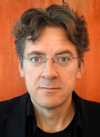Editorial
Dear Readers,
Fluid as the mercury, whose trade and exchange of knowledge across Eurasia formed the theme of a workshop held roughly a year ago, none of these conference themes could even be addressed without engaging in various forms of translation. This point includes translation not only in its most concrete linguistic sense, but also in the sense of a transposition between competing scientific methodologies and disciplines, across cultures, media, regions, laws and religions. All of us working at the URPP are engaged in translation on a daily basis, whether we ponder over a recalcitrant Sanskrit verse or simply communicate in front of the coffee machine. Translation thus forms a topic as natural as it is intricate to guarantee lively exchanges over the coming year, when it will be addressed from a great variety of perspectives at our annual conference in November. You can have a sneak preview of its concept and focus in the interview with Hans B. Thomsen, Dinah Zank and Jeanne Egloff, three members of our Research Field 2: Entangled Histories, which organizes it.
In Ancient Chinese yì 譯 like in Latin inter-pretum, the act of oral translation was conceptualized via the idea of ‘exchange.’ Whether etymologically viable or not, the shared commercial metaphor reflected in those terms, is clearly bi-directional and thus quite unlike the directed vector underlying trans-lation as ‘carrying across.’ Since the business of exchange is quintessentially fair and open-ended, it may well happen that some things work better in translation than in the original. Not because they are easier to understand, but because the translation surpasses the original in one respect or another. Think of those moments you may have had, when a favorite actor you have grown up with watching dubbed movie versions, all of a sudden is heard with his sagging, squeaky or stuck-up original voice. How much nicer, for instance, to listen to Christian Brückner than to De Niro! That something very meaningful can arise from the interstices of translation, even from the chasm of downright mistranslation, that some languages may seem more congenial vis-à-vis an intended content than others, strikes me as a topic very worthy of pursuing. Not via dubious claims of ontological differences between what can be expressed in one language, but allegedly not in another; rather, in the spirit of Borges, who, twinkle in the eye, said in one of his essays El original es infiel a la traduccion (“Sobre el Vathek de William Beckford”, 1943). The inherent creativity of infidelity in translation may unfold in whatever direction, consciously or not. At the same time Ezra Pound recreated, rather than “translated” the earliest collection of Chinese poetry (Shījīng 詩經) with the help of the now largely forgotten Sinologist William McNaughton (1933–2008), the poetic form of his Cantos in turn inspired Xú Zhìmó 徐志摩 (1897–1931), one of the founders of modern Chinese versification. It is hoped that the conference will uncover many more such inextricable entanglements, unexpected points of contact and spiral movements in translation!
To my co-director Angelika Malinar and to all those who have helped by contributing to this bulletin, I wish to express my sincerest thanks.
Prof. Dr. Wolfgang Behr
Academic Director
(Asia & Europe Bulletin, 3/2014, p. 3)
